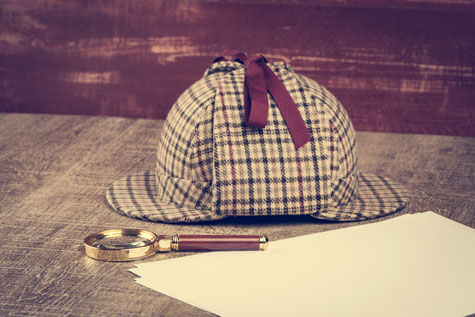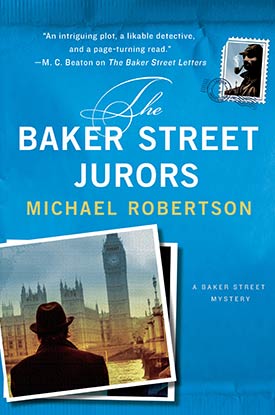
It’s not always easy to find jurors when you need them. And, in London, as on our side of the pond, the legal system always needs them—often desperately.
So, would it be surprising if a jury summons got sent to Sherlock Holmes at 221B Baker Street?
The Crown Prosecution Service fills its quota of jurors from voter registration lists. Pretty much all it would take for a jury summons to be sent to Sherlock Holmes is for someone—at some point in the 129 years since the Great Detective first appeared in Beeton’s Christmas Annual—to have submitted his name and address to the electoral register on his behalf. And, everyone knows his name and address.
Of course, 221B Baker Street did not exist when Sir Arthur Conan Doyle first created an occupant for it. The address numbers ran only into the 100s. But, in 1932, a 200 block was added on, and a British bank, the Abbey National Building Society, put up its new headquarters right there in the new block—taking up all the numbers from 200 through the 240s.
From that point on, until the Abbey House building was taken down in 2005, whenever someone wrote a letter to Sherlock Holmes—as many have (a young girl loses her cat, an old man has an encrypted treasure map, a computer thinks Mr. Holmes may have already won a publishers sweepstakes)—the Royal Mail has faithfully delivered that post to Abbey House on Baker Street. One has to believe the same would be true for a jury summons.
 But, in modern times and the real world, who would receive such a summons and how would they respond to it? That’s the subject of my latest novel, The Baker Street Jurors. In writing it, I found myself looking into how Holmes and Watson felt about the legal process generally and about juries in particular.
But, in modern times and the real world, who would receive such a summons and how would they respond to it? That’s the subject of my latest novel, The Baker Street Jurors. In writing it, I found myself looking into how Holmes and Watson felt about the legal process generally and about juries in particular.
I made a list of quotations from the canon in that regard. You might find others—there are many lists for Sherlock Holmes —but regarding justice, the law, and juries, here is my personal short list of favorites:
“Let us see if there is justice upon the earth, or if we are ruled by chance.”
This one is from A Study in Scarlet, in which Jefferson Hope explains to Sherlock Holmes how he presented an enemy with a choice between two pills, one poison and one not. The novel makes the answer to the question clear.
“It's every man's business to see justice done.”
This is from The Crooked Man. Sherlock Holmes is stating his reason (and perhaps any unofficial sleuth’s reason) for getting involved in a case, even though he is not with the police. And, we know that Conan Doyle must have felt the same way, given what he himself did to exonerate an innocent solicitor in the George Edalji case.
Not everyone is happy about Holmes making justice his business. In The Adventure of the Empty House, Colonel Moran, the second most dangerous man in London, having been trapped by Holmes, expresses his displeasure to Inspector Lestrade:
“You may or may not have just cause for arresting me,” said he, “but at least there can be no reason why I should submit to the gibes of this person. If I am in the hands of the law let things be done in a legal way.”
Regarding juries, there are differences of opinion in the canon. In The Sign of the Four, there is this:
“If my own servant could not believe my innocence, how could I hope to make it good before twelve foolish tradesmen in a jury-box?”
But “foolish” is Major John Sholto’s word, not Watson’s or Holmes’s, and we may make allowances for the Major, who had been under some stress. In other references, jurors are held in somewhat higher regard.
In The Boscombe Valley Mystery, after Sherlock Holmes gives a detailed description of a murderer he has never seen, there is this:
Lestrade laughed. “I am afraid that I am still a skeptic,” he said. “Theories are all very well, but we have to deal with a hard-headed British jury.”
And in The Hound of the Baskervilles, we get a better idea of how Holmes himself feels about juries:
“You and I know that he died of sheer fright, and we know also what frightened him; but how are we to get twelve stolid jurymen to know it?”
In The Adventure of the Abbey Grange, there is a reference that tells us what Sherlock Holmes thinks the best possible juryman should be. Holmes has personally apprehended the guilty party, with no police around. But, there are extenuating circumstances, and Holmes hesitates to turn the man over to the authorities. Instead, he decides to improvise and do things “in a proper way,” and for that he turns to Watson:
“Watson, you are a British jury, and I never met a man who was more eminently fitted to represent one.”
And finally, here’s one more quote about juries. Though it is not from the Sherlock Holmes canon, I still like it a lot. It’s from Anatomy of a Murder, by Robert Traver:
“Lofty abstractions about individual liberty and justice do not enforce themselves. These things must be reforged in men’s hearts every day. And they are reforged by the law, for every jury trial in the land is a small daily miracle of democracy in action.”
To learn more or order a copy of The Baker Street Jurors, visit:
opens in a new window![]() opens in a new window
opens in a new window![]()
Michael Robertson lives in southern California. The previous books in this series, The Baker Street Letters, The Brothers of Baker Street, The Baker Street Translation, and Moriarty Returns a Letter were also published by Minotaur/Thomas Dunne Books.
